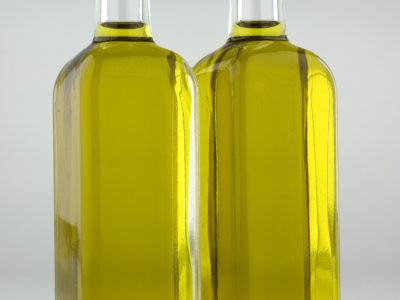This Paleo-friendly fat has been extracted from olives and used for thousands of years. Olive oil is one of the oldest (and most revered!) edible oils out there, with culinary uses dating back to at least 1000 BC, and other uses scrolling back even further (such as anointing priests and kings). Not to mention, it’s versatile and delicious (olive oil ice cream, anyone?). Combined with mounting research suggesting olive oil is cardioprotective, it’s no wonder that this is one of the least controversial fats out there—given the green light by the Paleo community, vegans, vegetarians, low-carbers, the Harvard School of Public Health, and even the USDA. Not many foods can claim such widespread acceptance!
Olive oil is an amazing source of nutrition. One tablespoon of olive oil contains mostly monounsaturated fat, with some saturated and some polyunsaturated fats. Additionally, olive oil has 10% of your RDV (again, this is from just one tablespoon!) of vitamin E as well as smaller amounts of vitamin K1 (the plant-based vitamin K, called phylloquinone) and iron.
There have previously been some concerns about olive oil as a cooking oil. Along with its high monounsaturated fat content, olive oil contains 1.4g of polyunsaturated fat (PUFA) per tablespoon (mostly in the form of linoleic acid), which is about 10% of its total fat content. Like all polyunsaturated fats, linoleic acid has multiple double bonds that are vulnerable to oxidation, especially when exposed to high temperatures (hello, fried foods!). Likewise, monounsaturated fat contains a single double bond, which makes it less heat-stable than saturated fats (though a definite step up from PUFAs) on the oxidation front. But, across the board, the research shows that even with a fair amount of heat exposure, extra virgin olive oil resists oxidation better than many other cooking oils. In one study, it took over 24 hours (a day straight!) of frying before olive oil generated enough polar compounds to be considered harmful. In another study, even after 36 hours of cooking, olive oil had retained most of its beneficial vitamin E content. I have an even more in-depth conversation about this topic in my post, Olive Oil Redemption: Yes, It’s a Great Cooking Oil.
I write about these amazing benefits and some of the controversy in part to emphasize how important a super high quality extra virgin olive oil, like ones from Fresh-Pressed Olive Oil Club, is.


 Eggs
Eggs